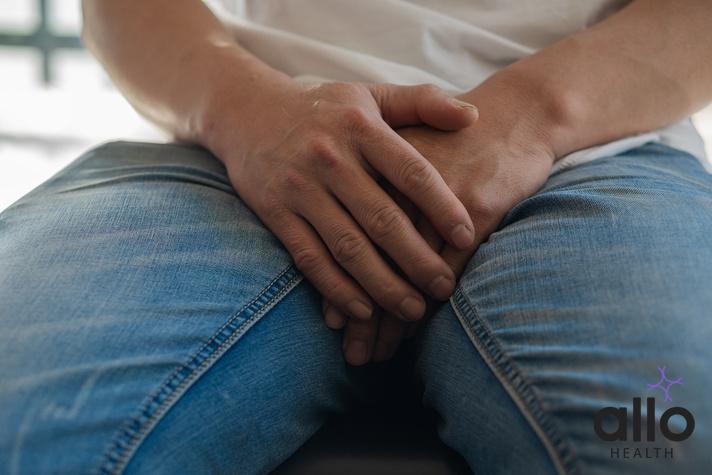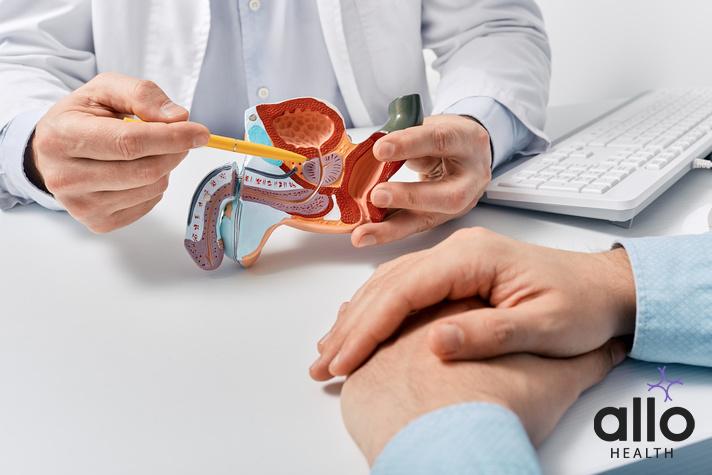Understanding Why Your Penis Burns After Peeing: Causes and Solutions

Allo Health is dedicated to personalized well-being, offering support and trusted information tailored to individual health goals. The platform emphasizes human-generated content, led by a distinguished medical team of experts, including physicians and sexual health specialists. Their commitment to credibility involves rigorous fact-checking, authoritative research, and continuous updates to ensure accurate, up-to-date information. Allo Health's unique approach goes beyond conventional platforms, providing expert-led insights and a continuous commitment to excellence, with user feedback playing a crucial role in shaping the platform's authoritative voice.

Dr. Raj. R holds an undergraduate medical degree from the Philippines, and has a bachelors background in Psychology. His experience working in the field of urology further brought his interest forward in working towards his passion of understanding the science of attraction, intimacy, sex and relationships. A key motto he practices by remains unprejudiced and non-judgemental care.
Why This Was Upated?
Our experts continually monitor the health and wellness space, and we update our articles when new information became available.
Updated on 25 June, 2024
- Article was updated as part of our commitment to diversity, equity, and inclusion.

"The following blog article provides general information and insights on various topics. However, it is important to note that the information presented is not intended as professional advice in any specific field or area. The content of this blog is for general educational and informational purposes only.
Book consultation
The content should not be interpreted as endorsement, recommendation, or guarantee of any product, service, or information mentioned. Readers are solely responsible for the decisions and actions they take based on the information provided in this blog. It is essential to exercise individual judgment, critical thinking, and personal responsibility when applying or implementing any information or suggestions discussed in the blog."
Penile burning sensation after urination is an uncomfortable and sometimes painful experience that can have a variety of causes. In this article, we will explore the different factors that can contribute to this condition, as well as how it can be treated and prevented. Whether you are experiencing symptoms for the first time or are looking for solutions to ongoing issues, it is important to have a clear understanding of the potential causes and solutions.
Understanding the Symptoms of Burning Sensation During Urination
Before delving into potential causes of burning after urination, it is helpful to first understand the specific symptoms involved. In general, a burning sensation in the penis can range from mild discomfort to intense pain. It may occur before, during, or after urination, and may be accompanied by other symptoms such as:
- Difficulty or pain when starting to urinate
- Increased frequency or urgency to urinate
- Blood in the urine
- Foul-smelling urine
- General discomfort or pain in the genital area
If you are experiencing any of these symptoms, it is important to seek medical attention as soon as possible. In most cases, penile burning is not a sign of a serious medical condition, but it can be a symptom of a more serious underlying issue such as a urinary tract infection or sexually transmitted infection.
It is important to note that burning during urination can also be a symptom of prostate problems in men. The prostate gland is located near the bladder and urethra, and inflammation or infection of the prostate can cause pain and burning during urination. Other symptoms of prostate problems may include difficulty starting or stopping urination, weak urine flow, and pain in the lower back or abdomen.
In women, burning during urination can be a symptom of a urinary tract infection or vaginal infection. These infections can cause irritation and inflammation in the urinary tract or vagina, leading to pain and burning during urination. Other symptoms of these infections may include pelvic pain, vaginal discharge, and fever.peni
What Causes Burning Sensation During Urination in Men?
There are several potential causes of burning after urination in men. These include:
The Role of Urinary Tract Infections in Penile Burning Sensation
One of the most common causes of burning during urination is a urinary tract infection (UTI). This occurs when bacteria invade the urinary system, causing inflammation and irritation. UTIs can occur in any part of the urinary system, including the bladder, urethra, and kidneys. Men are less likely to get UTIs than women, but they can still occur. Common symptoms of a UTI include frequent urination, pain or burning during urination, cloudy or strong-smelling urine, and pelvic pain. Treatment typically involves antibiotics.
How Sexually Transmitted Infections Can Cause Penile Burning Sensation
Another potential cause of burning sensation during urination in men is a sexually transmitted infection (STI). STIs such as chlamydia, gonorrhea, and herpes can all cause penile burning, as well as other symptoms such as discharge, sores, and rash. Many STIs can be easily treated with antibiotics or antiviral medications, but it is important to seek medical attention as soon as possible to avoid complications.
Other Possible Causes of Burning Sensation During Urination in Men
In addition to infections, there are several other potential causes of burning after urination in men, including:
- Prostate infections or enlargement
- Kidney stones
- Irritation or inflammation of the urethra
- Allergies or irritants such as soaps, lubricants, or condoms
- Interstitial cystitis (inflammation of the bladder)
Aside from the aforementioned causes, there are also lifestyle factors that can contribute to a burning sensation during urination in men. For instance, dehydration can lead to concentrated urine, which can irritate the urinary tract. Consuming spicy or acidic foods and drinks can also irritate. Additionally, holding in urine for too long can cause bacteria to multiply, leading to infection and a burning sensation during urination.
It is important to note that a burning sensation during urination can also be a symptom of more serious conditions such as bladder cancer or prostate cancer. If the burning sensation persists or is accompanied by other symptoms such as blood in the urine or pain in the lower back or abdomen, it is important to seek medical attention immediately.
Risk Factors That Increase the Likelihood of Penile Burning Sensation
Several factors can increase the likelihood of experiencing burning after urination in men. These include:
- Being sexually active
- Engaging in anal sex
- Having multiple sexual partners
- Having a history of UTIs or other infections
- Having a weakened immune system
- Using certain types of birth control or lubricants
In addition to the above-mentioned factors, certain medical conditions can also increase the likelihood of experiencing a penile burning sensation. These include diabetes, kidney stones, and sexually transmitted infections such as chlamydia and gonorrhea. It is important to seek medical attention if you experience persistent burning or pain during urination, as it could be a sign of a more serious underlying condition.
When to See a Doctor About Penile Burning Sensation After Urination
If you are experiencing any of the symptoms listed above, it is important to seek medical attention right away. Your doctor can perform a physical exam and run tests to determine the underlying cause of your symptoms. In some cases, your doctor may refer you to a specialist such as a urologist or infectious disease specialist.
It is important to note that delaying medical attention for penile burning sensation after urination can lead to complications such as urinary tract infections, sexually transmitted infections, and even kidney damage. Therefore, it is crucial to seek prompt medical attention if you experience any of these symptoms.
What Tests and Examinations Are Needed to Diagnose Penile Burning Sensation?
Depending on your specific symptoms and medical history, your doctor may recommend several tests and examinations to diagnose the cause of your penile burning. These may include:
- Urine tests to check for infection
- Blood tests to check for STIs or other infections
- Physical examination of the genitals
- Prostate exam (for older men or men with symptoms of prostate issues)
- Imaging tests such as ultrasound or CT scan
- Cystoscopy (a procedure to examine the bladder and urethra with a camera)
In addition to these tests and examinations, your doctor may also ask you about your sexual history and any recent changes in your lifestyle or habits that could be contributing to your symptoms. It is important, to be honest and open with your doctor to receive an accurate diagnosis and appropriate treatment.
Understanding and Addressing Non-STI Causes of Burning Sensation at the Urethra Tip
Feeling a burning sensation at the tip of the urethra can be concerning, whether you’re male or female. This symptom is often associated with urinary tract infections (UTIs) or sexually transmitted infections (STIs) like chlamydia or gonorrhea. However, there are also non-STI-related reasons for this discomfort.
The urethra, the tube leading from the bladder to discharge urine outside the body, can become irritated for several reasons besides STIs. This article explores the common non-STI causes, accompanying symptoms, diagnosis methods, and available treatments for a burning sensation at the urethra tip.
Common Non-STI Causes
- Urinary Tract Infections (UTIs): UTIs occur when bacteria enter and multiply in the bladder, often after sexual activity. While anyone can get a UTI, females are more susceptible due to their shorter urethras.
- Urethritis: This inflammation of the urethra can result from irritation caused by products like soaps, deodorants, or spermicides, physical trauma, or poor hygiene.
- Kidney Stones: These hard mineral masses can cause pain when passing through the urinary tract, especially if they reach the urethra tip.
- Urethral Stricture: Scar tissue in the urethra can narrow and inflame it, leading to a burning sensation.
- Prostatitis: In males, inflammation of the prostate gland can cause discomfort at the urethra tip.
- Prostate Cancer Treatment: Treatments like brachytherapy for prostate cancer may result in lasting urethra discomfort.
Accompanying Symptoms
- For UTIs: Frequent urge to urinate, cloudy or bloody urine, pelvic pain in females, and sometimes fever or chills.
- For Urethritis: Possible discharge, odor, or testicular pain and swelling in males.
- For Kidney Stones: Severe pain in the back and side, nausea, and cloudy or foul-smelling urine.
- For Urethral Stricture and Prostatitis: Difficulty urinating, weak urine stream, and frequent urination, especially at night.
Could It Be an STI?
While STIs like chlamydia and gonorrhea are common causes, non-gonococcal urethritis (NGU) is another STI that might cause similar symptoms without the presence of gonorrhea or chlamydia. Symptoms include burning during urination and discharge. It’s important to get screened if you suspect NGU.
Diagnosis
Diagnosing the cause involves a detailed medical and sexual history, a physical examination, and possibly diagnostic tests like cystoscopy, pelvic MRI, urine tests, and more. Based on the diagnosis, a specialist referral may be necessary.
Treatments
- For UTIs: Antibiotics are the standard treatment.
- For Urethritis: Antibiotics if an infection is present, along with pain relief medications and avoiding irritants.
- For Kidney Stones: Hydration, pain relievers, and possibly procedures to remove or break up larger stones.
- For Urethral Stricture: Treatments range from catheterization to surgery.
- For Prostatitis: Antibiotics, alpha-blockers, and anti-inflammatory drugs.
- For Prostate Cancer Treatment Side Effects: Anti-inflammatory medications or pausing treatment if advised by a doctor.
A burning sensation at the urethra tip is a symptom that can arise from various conditions beyond STIs. Recognizing the accompanying symptoms and undergoing proper diagnosis are crucial steps towards effective treatment. If you experience such discomfort, consult a healthcare provider to determine the cause and appropriate treatment plan.
Over-the-Counter and Prescription Medications That Can Help Manage Penile Burning Sensation
If your penile burning is caused by an infection, your doctor may prescribe antibiotics or antiviral medications to treat the underlying issue. Several over-the-counter and prescription medications can help manage symptoms such as pain, discomfort, and inflammation. These may include:
- Pain relievers such as ibuprofen or acetaminophen
- Antihistamines or corticosteroids to reduce inflammation and itching
- Topical creams or ointments to reduce pain and irritation
It is important to note that while these medications can help manage symptoms, they may not necessarily cure the underlying cause of the penile burning sensation. It is important to seek medical attention if you experience persistent or severe symptoms, as they may be indicative of a more serious condition.
In addition to medication, several lifestyle changes can help manage penile burning sensation. These may include avoiding irritants such as harsh soaps or detergents, wearing loose-fitting clothing, and practicing good hygiene habits. It is also important to practice safe sex and to avoid sexual activity until the underlying cause of the burning sensation has been identified and treated.
Home Remedies for Reducing Penile Burning After Peeing
In addition to medication, several home remedies may help reduce symptoms of penile burning after peeing. These may include:
- Drinking plenty of water to flush out the urinary system
- Applying a warm compress to the genital area
- Avoiding irritants such as perfumes, soaps, or douches
- Wearing loose-fitting clothing and underwear
Another effective home remedy for reducing penile burning after peeing is to consume cranberry juice. Cranberry juice contains compounds that can help prevent and treat urinary tract infections, which can cause burning sensations during urination.
Additionally, practicing good hygiene habits can also help reduce symptoms of penile burning after peeing. This may include washing the genital area with mild soap and warm water and drying thoroughly after urination or bathing.
Preventing Recurrent Episodes of Penile Burning Sensation After Peeing
To prevent future episodes of penile burning sensation, it is important to take steps to reduce your risk of infection and inflammation. This may include:
- Practicing safe sex by using condoms and limiting the number of sexual partners you have
- Drinking plenty of water to flush out the urinary system
- Avoiding irritants such as soaps or lubricants that may trigger symptoms
- Taking antibiotics as prescribed and completing the full course of treatment
- Maintaining good hygiene by showering regularly and washing the genitals thoroughly
Another important step in preventing recurrent episodes of penile burning sensation is to avoid holding in urine for long periods. When urine is held in the bladder for too long, it can lead to bacterial growth and infection. It is recommended to urinate as soon as you feel the urge to go.
In addition, incorporating probiotics into your diet may also help prevent future episodes. Probiotics are beneficial bacteria that can help maintain a healthy balance of bacteria in the urinary tract, reducing the risk of infection and inflammation. Foods such as yogurt, kefir, and sauerkraut are good sources of probiotics.
The Importance of Safe Sexual Practices in Reducing the Risk of STIs and UTIs
Finally, it is important to emphasize the role of safe sexual practices in reducing the risk of both STIs and UTIs. This includes using condoms during sex, getting regular STI testing, and limiting the number of sexual partners you have. By taking steps to protect yourself and your sexual health, you can reduce the likelihood of experiencing uncomfortable symptoms such as burning after urination.
Conclusion
In conclusion, penile burning after urination can be caused by a variety of factors, including infections, inflammation, and irritants. By understanding the specific symptoms and causes of penile burning, as well as the treatment and prevention options available, you can take steps to manage your symptoms and prevent future episodes. If you are experiencing any of the symptoms listed above, it is important to seek medical attention as soon as possible to avoid complications and achieve relief from your discomfort.
It is also important to note that practicing good hygiene can help prevent the development of UTIs and other infections. This includes washing your genitals regularly with mild soap and warm water, wiping from front to back after using the bathroom, and urinating after sexual activity to flush out any bacteria that may have entered the urethra.
Additionally, certain lifestyle factors can increase your risk of developing UTIs and other infections. These include smoking, consuming excessive amounts of alcohol, and having a weakened immune system. By making healthy choices and taking care of your body, you can reduce your risk of experiencing uncomfortable symptoms such as penile burning after urination.
Most Asked Questions
-
What are the common causes of a burning sensation after urination in men?
The most frequent causes include urinary tract infections (UTIs), sexually transmitted infections (STIs) like chlamydia and gonorrhea, prostate issues (such as prostatitis), kidney stones, and urethral irritation from products like soaps or lubricants. Other factors, such as dehydration or dietary irritants, can also contribute to this discomfort.
-
When should I see a doctor for a burning sensation after urination?
You should consult a healthcare provider if the burning sensation persists, is accompanied by symptoms like blood in the urine, foul-smelling urine, fever, or if you experience difficulty urinating. Immediate medical attention is crucial to prevent complications and address any underlying conditions.
-
How is the cause of the penile burning sensation after urination diagnosed?
Diagnosis typically involves a combination of urine tests (to check for infections), blood tests (for STIs and other conditions), a physical examination of the genitals, and possibly imaging tests like ultrasounds. For men, a prostate exam may also be recommended if there are symptoms indicating prostate issues.
-
What treatments are available for penile burning sensation after urination?
Treatment depends on the underlying cause. UTIs and STIs are generally treated with antibiotics. For issues like kidney stones, treatment may include pain relievers and methods to help pass the stones. Prostatitis might be managed with antibiotics, alpha-blockers, or anti-inflammatory drugs. Lifestyle changes and home remedies can also help alleviate symptoms.
-
How can I prevent a burning sensation after urination?
Preventive measures include practicing safe sex (using condoms and limiting the number of sexual partners), maintaining good hygiene, staying hydrated, avoiding irritants (such as harsh soaps or chemicals), and not delaying urination for too long. Regular STI screenings and managing health conditions that could increase the risk of UTIs, like diabetes, can also help prevent this discomfort.






































